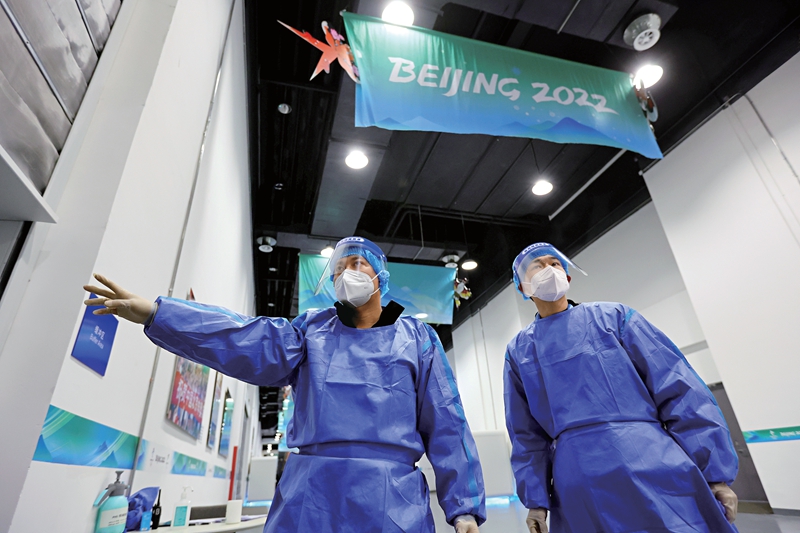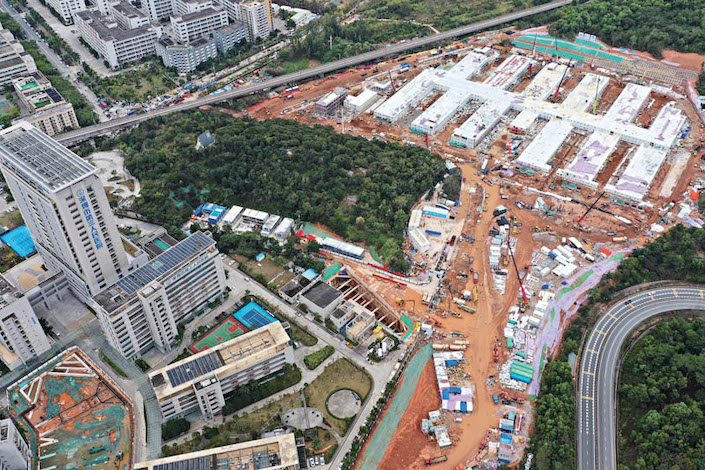CX Daily: Beijing Gears Up for Winter Olympics Amid Omicron Threat

Olympics /
Cover Story: Beijing gears up for Winter Olympics amid omicron threat
In two weeks, Beijing will become the first city in more than 120 years of modern Olympic history to host both summer and winter games. Beijing was the site of the Summer Olympics in 2008 and is gearing up for the winter games starting Feb. 4.
Even after the successful 2008 summer games, Beijing faces unprecedented challenges as the rapidly spreading omicron variant of Covid-19 breaks through China’s “Covid Zero” strategy.
More than six dozen Covid-19 cases found among Beijing Olympics early arrivals
Flood /
Zhengzhou officials ‘deliberately obstructed’ reporting of deaths, disappearances in flooding, report finds
An investigation by China’s central government revealed misconduct by local officials in Zhengzhou, who “deliberately obstructed” the reporting of the deaths and disappearances of over 100 people in devastating flooding last July.
Nearly 400 people in Henan province died in the flooding or were still missing as of Sept. 30, 95% of them in regional capital Zhengzhou, according to the Friday report (link in Chinese) on the city’s disaster response. The province as a whole suffered direct economic losses worth 120 billion yuan ($19 billion), said the report published on the website of the Ministry of Emergency Management.
Opinion: The Zhengzhou disaster cover-up spotlights a longstanding reflex
FINANCE & ECONOMY
In the past decade, authorities announced and implemented a series of measures to unify the markets. Photo: VCG
Bonds /
China gets a step closer to unifying its fragmented $20 trillion bond market
China’s central bank and top securities regulator approved a new set of rules designed to further connect the country’s two bond markets by establishing a mechanism that allows investors from one to trade on the other.
The measures (link in Chinese) for connecting the interbank and exchange bond markets mark the latest move in the nation’s years-long push to unify its fragmented $20 trillion bond market, whose different rules have added to red tape for traders.
The mechanism laid out in the rules will allow institutional investors on the exchange bond market, including qualified foreign institutions, to trade bonds, asset-backed securities and other eligible products on the interbank market, and vice versa.
Carbon /
China needs to remake its energy system to meet climate goals, group says
To realize its dual carbon goals, China should roll out a carbon tax, improve its national carbon market and further develop tech and innovation, according to a regional macroeconomic surveillance organization.
The ASEAN+3 Macroeconomic Research Office (AMRO) delivered the policy suggestions in an analytical note released Jan. 17, titled “Policy Challenges for China’s Carbon Neutrality.”
Spillover /
China sees smaller spillover impact from Fed moves than before
A Chinese foreign exchange official said U.S. monetary tightening may cause less-severe spillover effects than in the past, downplaying concerns about potential capital outflows as Beijing embarks on an easing cycle to stimulate economic growth.
China is better positioned to deal with changes in the external environment due to the export-driven growth in foreign exchange deposits, more attractive yuan-denominated assets, limited pressure on onshore entities to repay foreign debt, and a more flexible Chinese currency, said Wang Chunying, spokeswoman of the State Administration of Foreign Exchange.
Quick hits /
SoftBank to expand vision fund staff for more Japan investment
Editorial: China’s demographic trend can’t be reversed, but can be managed
BUSINESS & TECH
In late January 2020, more than 10,000 workers built a new campus for the Third People's Hospital of Shenzhen for emergency use in 20 days to accept Covid-19 patients.
Health care /
In Depth: China’s lagging expansion of medical infrastructure
China has been pouring billions of dollars into public health infrastructure since the Covid-19 pandemic broke out, expanding hospitals and infectious disease treatment facilities to upgrade the country’s arsenal for fighting the virus.
But as the pandemic enters its third year with the omicron variant causing a global surge of infections, China still faces enormous challenges of uneven distribution of medical resources across its vast territory. Construction of intensive care units (ICUs) is lagging behind; infectious disease hospitals are barely meeting standards in smaller cities; and there aren’t enough doctors, nurses and other caregiving staff to go around, medical experts say.
Foxconn /
Foxconn partners with Indonesia to make electric cars
Foxconn Technology Group, the world's largest contract electronics manufacturer, said it will partner with Indonesia’s Ministry of Investment (BKPM) and three companies to work on electric vehicle (EV) production in the resources-rich Southeast Asian country.
This is the latest EV-related development for the Taiwan-based iPhone assembler, formally known as Hon Hai Precision Industry Co. Ltd., which in October showcased three self-designed EV models (link in Chinese). Chairman Yang-wei Liu said he expected the EV business to make up 5% of the company’s total revenue by 2025.
Property /
Kaisa undergoes audit on order of Guangdong government
PricewaterhouseCoopers audited the assets of Kaisa Group Holdings Ltd. on the order of the government of southeast China’s Guangdong province to assess the troubled developer’s financial condition, Caixin learned.
Kaisa is one of a raft of liquidity-squeezed major property developers in China including China Evergrande Group whose tenuous condition is shaking global bond markets. Known as China’s first developer to default on dollar debt back in 2015, Kaisa was labeled a defaulter again after it failed to repay a $400 million dollar bond that matured Dec. 7.
MIT /
MIT professor targeted by ‘China Initiative’ asks U.S. Congress to review dismissed espionage allegations
An MIT professor called on Congress to investigate the Justice Department’s “China Initiative” on economic espionage after prosecutors dismissed charges against him.
The dismissal was “in the interests of justice,” according to a statement from the U.S. attorney for the District of Massachusetts issued last Thursday.
The statement said that the office concluded that “we can no longer meet our burden of proof at trial” after assessing new information obtained about the case of Gang Chen, a 57-year-old nanotechnologist at the Massachusetts Institute of Technology, who was arrested in January 2021 on suspicion of failing to disclose millions of dollars in funding he allegedly received from China.
Quick hits /
As electric car subsidies dry up, BYD hikes its prices
Kuaishou users sell far more in 2021 than in previous two years
Xiaohongshu fined after reports it failed to police sexually suggestive content that included minors
GALLERY
Street life returns as Xi’an eases Covid curbs
Recommended newsletter for you /
China Green Bulletin Premium - Subscribe to join the Caixin green community and stay up to date with the most exclusive insights on ESG, energy and carbon. Sign up here.
Thanks for reading. If you haven’t already, click here to subscribe.
- MOST POPULAR




